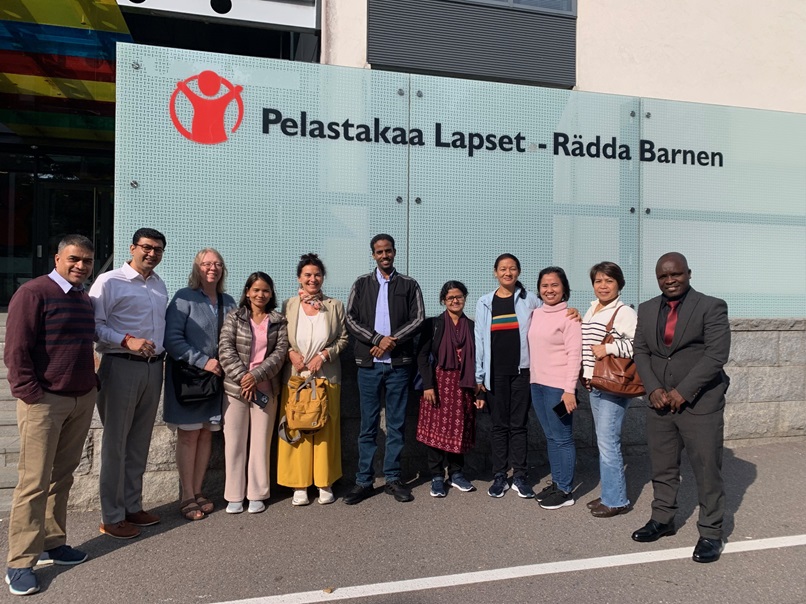A workshop on “strengthening ICDP as part of Child Sensitive Social Protection (CSSP)” took place in Helsinki, Finland, from 12th to 16th of September 2024. It was organized by Save the Children Finland who have been promoting ICDP internationally for several years now.
The workshop was attended by ICDP trainers who have been implementing the ICDP programme as part of the CSSP. Three ICDP trainers came from SC Nepal, two from SC Philippines, one from SC Zambia, one from SC Somalia, two from SC Finland and one ICDP trainer came from Normisjon Bangladesh. Nicoletta Armstrong from ICDP was also present. Disa Sjoblom, Mukesh Lath and Nicoletta facilitated the workshop.
The overall objective was to provide a forum for sharing between countries to ascertain ways of strengthening the work of ICDP, focusing especially on how to provide quality implementation and maintain the quality of the work after the end of the project intervention. Two days were dedicated to this, and on both days participants were split into small groups to explore the following two questions, with in-depth discussions afterwards in the big group:
- How can you enhance the parents to practice 8 guidelines during the period of implementation?
- How to sustain caregivers’ practice after our involvement has finished/mechanisms of sustainability.
On the first day, the morning was dedicated to sharing about the work in respective countries. Here are some of the highlights from that session:
Nepal: The concept of CSSP, with ICDP as part of it, is currently in process of being institutionalized at 9 local government levels, as well as having national government endorsement for it. There are 142 facilitators who in addition to ICDP, also deliver sessions on nutrition and family budgeting. Evaluations of their work showed significant impact. Ten animated films about the 8 guidelines for good interaction were produced to be sent to caregivers as reinforcement after each session.
ICDP trainers from Nepal presented the programme Building Brains, role playing the part that ties in well with the Comprehension dialogue of the ICDP programme. These are play activities that encourage parents to use books and games to enhance children’s learning and cognitive abilities.
Philippines: The CSSP work has been integrated in the 4Ps country programme, which consists of education, health, nutrition and ICDP. In 2018, 1429 parents were reached in region 8. The 2019-2021 impact study showed positive results, and in 2022 the work received government endorsement by region 8. In December 2022, an agreement was signed between SC Philippines and the Ministry (DSWD) for national scale up of the CSSP. There are 1068 facilitators, 18,031 parents were reached so far – the future seven-year plan is to reach 4 million. A new group of 213 social workers have been trained as ICDP facilitators and they aim to reach 869 000 parent leaders/volunteers. There are 17 regions with 17 regional programme coordinators of the 4Ps and all have asked to be trained. Family Development Division cooperates on materials. Animated videos were made on the 8 guidelines to enhance the quality of implementation by caregivers, as is was done in Nepal.
Zambia: The project (2022-2025) works with government cash transfer, promoting transparency and accountability, implementing ICDP parenting sessions, as well as resilience building sessions, in the districts of Kalulushi and Lufwanyama, in the Copperbelt province. A total of 59 groups of caregivers were trained, in these two districts; 1066 caregivers were reached. Cooperation is with the Ministry of Social Affairs, who have a volunteering policy, so many facilitators are volunteers. A concept note will be sent to the Ministry for a scale up.
Somalia: The work of CSSP (2022 – 2025) has so far reached 625 households in two districts of Somaliland, namely working in 3 IDP camps in Hargeisa and in Berbere village. The milestones achieved include the first ever review of Social Protection in the country, the signing of the policy for Social Protection by the President of the country in 2024, and the recognition of Social Protection by the National Development Plan. Preparations for scaling up of the CSSP that includes the ICDP programme is in planning. A study of the impact of ICDP is in process, involving 400 persons in the experimental and 200 in the control group.
On the following day, an interesting presentation by Mark Millrine from CUBIC introduced participants to behavioural science as a way of increasing caregivers’ engagement on parenting programmes.
On the last day a visit took place to the premises of The Federation of Mother and Child Homes and Shelters (ETKL) in Helsinki, to meet Miia Pikulinsky from ETKL and the vice chair of ICDP Finland, Petra Zilliacus. Miia, welcomed everyone and presented a power point which showed a wide range of services, many of which included the ICDP programme. After that, Petra shared about the implementation of ICDP in Pargas. A pleasant and meaningful exchange of ideas took place and the workshop ended with a small ceremony when Nicoletta presented ICDP Trainer level diplomas to two new trainers, Adam Nyundo from Zambia and Abdilladif Ismail, from Somaliland.

